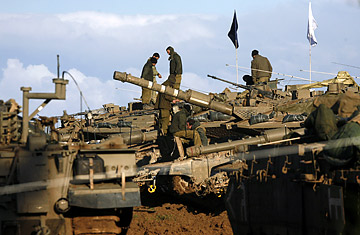
Israeli soldiers stand on their tanks in a deployment area near the Israeli border with the Gaza Strip.
For more than a week now, Israel's armored columns have been poised at the edge of Gaza, carefully drawn battle plans in hand, ready to launch the ground component of the military campaign to deter Hamas from firing rockets into Israel. Even as the Israeli air force pounded Gaza for a seventh day and Palestinian rocket fire continued, the soldiers living in and around their tanks and armored personnel carriers in the winter cold, on a constant state of high alert against mortar fire and possible guerrilla raids, were wondering out loud about what's holding back their political leaders from giving the green light. And the flirtation with various cease-fire proposals earlier in the week by the man in charge of Operation Cast Lead, Defense Minister Ehud Barak, has prompted a revival within the ranks of the nickname "Zig-Zag" — originally applied to Barak in reference to his skittish diplomacy as Prime Minister in 2000, ahead of the failed Camp David summit.
Although the air war has so far claimed more than 400 Palestinian victims, and continues to inflict damage on Hamas — as well as, inevitably, on the civilians around it — Israelis believe the attacks have not yet delivered the deterrent blow they desired. Nor did that change as a result of Sunday's strike that killed top Hamas political-military figure Nizar Rayan. Although the assault on one of the movement's most senior figures has been interpreted by Hamas as an intentional body blow — and may yet prompt a furious retaliation — Israeli officials did not characterize it as a "targeted killing." Indeed, Israeli military-intelligence sources tell TIME that Rayan was killed when he remained in his home after Israel had phoned and ordered those inside to evacuate — before striking to destroy command facilities in the house. Israel says it has used this "knock on the roof" practice of phoning warnings about strikes on the homes of Hamas leaders throughout the current campaign. Israeli officials say the campaign thus far has not significantly targeted or damaged Hamas' leadership and chain of command. (See pictures of Israel's campaign in Gaza.)
The answer to the question of what's restraining Barak and Prime Minister Ehud Olmert from launching a full-scale ground attack may be found in the goals of the Israeli operation and the time available. Israel has made clear from the outset that its objective is to attain a cease-fire on its own terms that will last at least a year or two. While they hope to weaken Hamas, Israel's leaders are aware that they're unlikely to destroy the organization, and among their primary concerns is to avoid getting dragged into a quagmire. Destroying Hamas would take a massive invasion of all of Gaza, but it would also require an open-ended reoccupation of the territory, a trap Olmert and Barak will avoid at all costs.
Israel is also acutely aware of the diplomatic clock. The Israelis certainly want the operation over before Barack Obama enters the White House on Jan. 20, so as not to demand of him a crisis response to the Israeli-Palestinian conflict. And the diplomatic moves already afoot by the U.S. and Europeans — and the mounting pressure on Arab regimes, including that of Palestinian Authority President Mahmoud Abbas in Ramallah, to intervene even if their unstated preference is to see Hamas hobbled — suggest that Operation Cast Lead's diplomatic window of opportunity will close a lot sooner. For all the above reasons, Barak and Olmert are wary of ordering the army in because they may not have an easy exit strategy.
But critics in the Israeli military establishment insist that even the limited goal of delivering a punishing blow to deter further Hamas attacks requires the Israeli military to get at close quarters with the militants, disrupting their structures and their chain of command and killing more of their fighters — even at the cost of Israeli casualties. They also fear that the coming Israeli election — in which both Barak and Foreign Minister Tzipi Livni are candidates, but the more hawkish Likud leader Benjamin Netanyahu is the front runner — may be complicating Israel's decision-making. So even if the window of opportunity is closing, there may yet be a brief ground incursion.
The dilemma of Olmert and Barak over how to end the campaign is nothing compared with that confronting President Abbas. He is facing a wave of anger sweeping across the West Bank, even within his Fatah organization, over his response to the Gaza events. Many Fatah leaders are demanding that Abbas not only break off the largely symbolic peace talks he continues to hold with the Israelis, but also that he end security cooperation between his forces and those of the Israelis. But Abbas can't afford to do that: Israel's Gaza campaign has actually strengthened Hamas politically, even in the West Bank, while further weakening Abbas. Without his security cooperation with Israel, Abbas knows that Hamas could easily take control of the West Bank too. The longer the Israeli offensive continues, the greater the damage to all the Arab moderates the U.S. has been hoping to rally in an alliance against the likes of Iran, Syria, Hamas and Hizballah.
A cease-fire is the inevitable outcome. The closing days — however long they extend — of the Israeli campaign are principally about shaping its terms.
— With reporting by Jamil Hamad / Bethlehem
